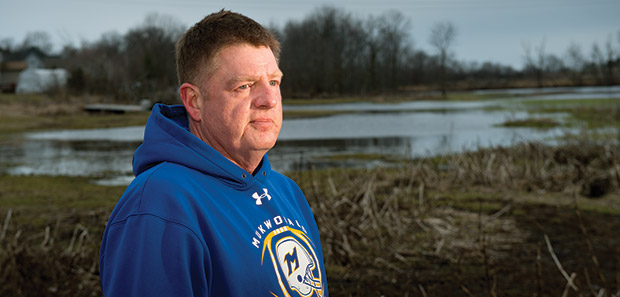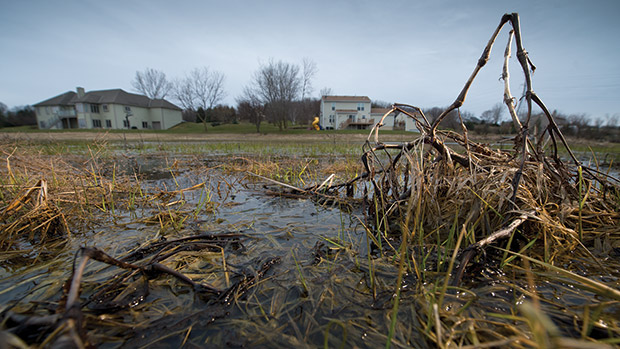Statute, clogged drain tile leave Big Bend tradesmen’s land submersed
By: Erika Strebel, [email protected]//April 5, 2017//
Statute, clogged drain tile leave Big Bend tradesmen’s land submersed
By: Erika Strebel, [email protected]//April 5, 2017//

William Ludwig and Brad Antoniewski recently became the unwilling owners of “lakefront” property.
No, the two Big Bend residents didn’t suddenly strike it rich. They just happened to be on the wrong side of a clogged drain tile. The results haven’t been pretty, especially since, even though the flooding was apparently connected to state work on a nearby interstate, Ludwig and Antoniewski are barred by statute from obtaining compensation.
Before floodwaters began rising at his property, Ludwig had been able in the warm months of the year to come home from work and see his children and other neighborhood kids playing softball or football outside his house. Now, he and his family can barely use their yard.
Garbage has floated down and collected outside. The standing water has bred mosquitoes and given rise to a nearly unbearable stench.
Antoniewski’s causes for complaint are similar. Ever since the flooding started, Antoniewski said, his two daughters, ages 6 and 9, haven’t been able to play in their 2-1/2-acre yard.
Making matters worse, both Ludwig and Antoniewski have seen their property values take a tumble. Fortunately for them, the floodwaters are finally starting to recede. Unfortunately, there’s little hope they will be to get compensation for the damage that has already been done.
Antoniewski and Ludwig’s troubles with flooding started in the spring of 2012, around the same time work was being done nearby on Interstate 43. When the flooding was at its worst at their properties, the water had reached a depth of six feet.
About a quarter of Ludwig’s property was submerged in standing water. Twenty-five mature trees in his yard were killed and his landscaping was ruined. He estimates it would cost him $16,700 to bring the yard back to what it had been before the flooding.
Antoniewski, an electrician, put his loss at more than $40,000, a figure that takes into account not only the cost of needed repairs but also money spent to build a berm and exterior sump pump to protect his property from further flooding. Antoniewski said water seeped into an extension built onto his garage and damaged a tractor, trucks and other equipment.
“I couldn’t leave it the way it was,” Antoniewski said. “I’m trying to restore as much as I can. I don’t know what I’m going to do. It’s a shame.”
Although it took years for state officials to stop the flooding, the men have been stuck footing the bill for the damage to their property, in part because of a state statute.
Ludwig, a plumber, had suspected the floodwaters were stemming from a clogged drain tile caused by the nearby road project. Yet, despite Ludwig’s efforts to work with the state Department of Transportation and local officials, the troubles continued.
Three years later, village officials found the source of the flooding — an abandoned drain tile believed to have been clogged with roots and vegetation because of neglect, according to WisDOT officials.

Ludwig tried to get some compensation by filing a request with the state Claims Board asking WisDOT to reimburse him for the $16,700 that it would take to salvage his backyard.
At a hearing Feb. 1 before the Claims Board, Ludwig lodged complaints against WisDOT, arguing that the state agency had been negligent in taking three years to mitigate the flooding.
WisDOT argued the road project had not been the cause of the drain tile’s clog. Moreover, it pointed out that, under state statute Wis. Stat. 88.87, Ludwig was barred from bringing his claim because the statute of limitations — which allows three years for filing claims — had run its course.
And, even if he had brought the claim before that, he could not recover damages, WisDOT officials contended. Instead, under the statute, Ludwig’s options include filing an inverse-condemnation lawsuit, which would essentially force WisDOT to buy the flooded part of his property. Barring that, he could sue for something outside of damages.
WisDOT also noted that Wisconsin has many drain tiles that do not show up in state records. Most of them are privately owned and were put in without anyone seeing a need to tell WisDOT. That was true with the drain tile in question in Ludwig’s case, WisDOT officials said.
Typically, private owners are the ones responsible for maintaining any tiles they’ve installed. But in Ludwig’s case, the tile in question was in a WisDOT right of way and its owner couldn’t be found, so state officials eventually agreed to step in to clear the clog.
Although some members of the state Claims Board had expressed sympathy with Ludwig, the board eventually denied his claim Feb. 21, concluding there was not enough evidence that WisDOT had been negligent.
In light of the board’s decision, both Ludwig and Antoniewski appear to be resigned to eating the cost of the flooding.
“I don’t think there’s anything else I can do,” Ludwig said. Follow @erikastrebel
Legal News
- Waukesha man sentenced to 30 years for Sex Trafficking
- 12-year-old shot in Milwaukee Wednesday with ‘serious injuries’
- Milwaukee man convicted of laundering proceeds of business email compromise fraud schemes
- Giuliani, Meadows among 18 indicted in Arizona fake electors case
- Some State Bar diversity participants walk away from program
- Wisconsin court issues arrest warrant ‘in error’ for Minocqua Brewing owner
- Iranian nationals charged cyber campaign targeting U.S. Companies
- Facing mostly white juries, are Milwaukee County defendants of color truly judged by their peers?
- Milwaukee Mayor speaks in D.C. Tuesday at White House water summit
- Chicago man sentenced to prison after being caught with ‘Trump Gun’
- FTC bans non-competes
- Gov. Evers seeks applicants for Dane County Circuit Court
WLJ People
- Power 30 Personal Injury Attorneys – Russell Nicolet
- Power 30 Personal Injury Attorneys – Benjamin Nicolet
- Power 30 Personal Injury Attorneys – Dustin T. Woehl
- Power 30 Personal Injury Attorneys – Katherine Metzger
- Power 30 Personal Injury Attorneys – Joseph Ryan
- Power 30 Personal Injury Attorneys – James M. Ryan
- Power 30 Personal Injury Attorneys – Dana Wachs
- Power 30 Personal Injury Attorneys – Mark L. Thomsen
- Power 30 Personal Injury Attorneys – Matthew Lein
- Power 30 Personal Injury Attorneys – Jeffrey A. Pitman
- Power 30 Personal Injury Attorneys – William Pemberton
- Power 30 Personal Injury Attorneys – Howard S. Sicula











